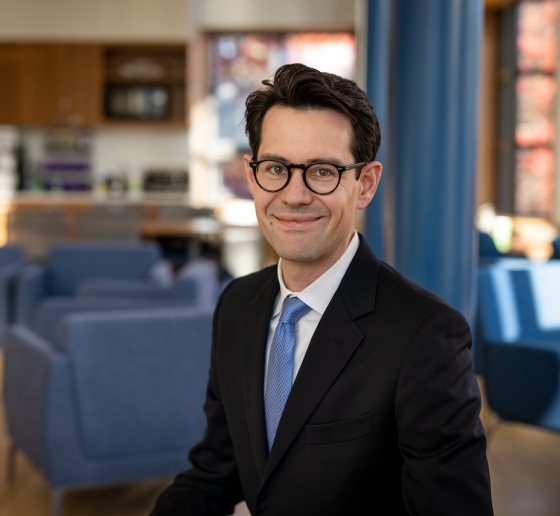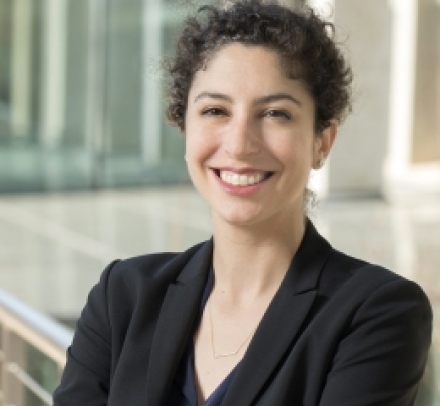Reilly Steel ’17: Focusing on the Intersection Between Business, Law, and Politics
The corporate law scholar and political scientist—who has worked in government, the courts, and private practice—joins the Columbia Law School faculty as an associate professor of law.

When Reilly Steel ’17 matriculated at Columbia Law School in 2014, he considered becoming an intellectual property lawyer. “I’d been running a record label that I co-founded and became fascinated by copyright law,” he says. “I loved running the business and dealing with all the legal issues, which got me excited about going to law school.”
Steel took Corporations as his first-year spring elective (taught by renowned Columbia Law professor Harvey Goldschmid ’65, who died that semester), and he discovered a new, unexpected passion: corporate law. “I loved it because, ultimately, corporate law is about people,” he says. “It’s about how people struggle for power within institutions. I find that fascinating, and that’s what got me on this path that is not the one I initially started on.”
Now, after stints in government, the courts, and private practice, Steel embarks on a new path by joining Columbia Law’s full-time faculty as an associate professor of law on July 1. He is already a familiar face on campus: For the past year, he has been an academic fellow at the Law School, a postgraduate research fellow at the Ira M. Millstein Center for Global Markets and Corporate Ownership, and a lecturer in law teaching LL.M. Legal Research and Writing.
An Interdisciplinary Scholar
In addition to a J.D. from Columbia, Steel is equipped with an M.A. in politics from Princeton University—and expecting to soon receive a Ph.D. Steel has a unique point of view as a scholar. His research uses empirical methods and other tools from the social sciences to study the strategic interactions between economic, legal, and political actors in both public and private institutions, focusing on the intersection between business, law, and politics.
“Business organizations and elites occupy an important place in American law and politics, due to not only their money but also less tangible assets like information,” he says. “It can be hard to get a solid understanding of the empirical facts about how these forces operate, though, and I’m hoping that my work can give us some clarity.”
He addresses this nexus directly in a working paper, “The Political Transformation of Corporate America, 2001–2022,” which investigates the conventionally held belief that corporate America is overwhelmingly conservative. Employing a machine learning protocol of his own design to merge two widely used databases, Steel analyzed the ideological leanings of 97,469 corporate directors and executives at 9,005 different U.S. companies, using ideology scores imputed from campaign contributions. He found that, on average, the observed ideology in corporate America is increasingly liberal but with significant variation across different industries and corporate roles. “That aspect of the paper gets the most press,” he says. “But I also studied a lot of related issues about how politics play out in corporate America, the drivers of change, and the consequences as well.” He plans to turn the project into a book.
In another working paper, “Lobbying Against Enforcement,” Steel examines how companies use political spending to fight regulatory enforcement, a practice that previous scholarship has suggested may be uncommon. Analyzing data on corporate political spending and investigations by the Securities and Exchange Commission, which he obtained in part through an original Freedom of Information Act request, he finds evidence that companies regularly use political spending to defend against enforcement. The paper further discusses potential concerns with these practices and policy interventions to address them.
Steel says he was “bit by the academic bug” as a 2L when he wrote a note—“The Underground Rulification of the Ordinary Business Operations Exclusion”—for the Columbia Law Review, worked as a research assistant for Zohar Goshen, Jerome L. Greene Professor of Transactional Law, and served as a teaching assistant for Eric Talley, Marc and Eva Stern Professor of Law and Business. After graduation, Steel went on to collaborate on scholarship with his former professors: He wrote a Yale Law Journal article with Goshen (“Barbarians Inside the Gates: Raiders, Activists, and the Risk of Mistargeting”) and is currently working with Talley on a paper about the politics of merger review.
Hands-On Experience
Immediately after law school, Steel went to Washington, D.C., as the Law School’s inaugural Millstein Public Service Fellow; he spent a year on the staff of the U.S. Senate Committee on Banking, Housing, and Urban Affairs and worked on some significant financial services legislation. “There were some major flaws in the legislation that I thought were pretty obvious as a matter of policy. But the politics of it all was really tricky,” he says. “And that got my interest in the political economy of financial regulation going and my wanting to get a Ph.D. in political science.”
He then served as a clerk to Chief Justice Leo E. Strine Jr. on the Delaware Supreme Court, followed by two years as an associate at Cravath, Swaine & Moore. “There are few better ways to understand the doctrine of corporate law than clerking on the Chancery Court or Supreme Court in Delaware,” he says. “It was particularly formative to clerk for Leo Strine, given his singular influence on the development of corporate law. It’s also pretty cool to see the opinions you worked on getting cited in law review articles and included in casebooks.”
Steel later co-wrote an article in the Iowa Law Review with Strine and fellow clerk Kirby M. Smith. In a post on The CLS Blue Sky Blog, the authors explained how their piece proposes a way for corporate directors and senior managers to consider employee, environmental, social, and governance factors (EESG) when seeking “to efficiently and effectively create a corporate culture and policies that promote ethical, fair, and sustainable behavior.”
When Steel joined Cravath in 2019, he considered it a critical part of his legal education. “Although I was already planning on pursuing a Ph.D. and academia, I thought it would be useful as a law professor to get some real-world practice experience,” he says. “It definitely was: It informs both my teaching and my research. Having an understanding of how things work on the ground has been really valuable.”
But as a Ph.D. candidate at Princeton, where he was a fellow with the Program for Quantitative and Analytical Political Science, Steel has had the opportunity to develop a sophisticated facility with empirical methods. (While at the Law School, he took a course in quantitative methods at Columbia’s Graduate School of Arts and Sciences.) “Getting my Ph.D. was a way to both immerse myself in the substance of political science and get some methodological chops,” he says.
Classroom Charisma
Steel enjoys being in the classroom. He credits his ease before an audience to his background as an actor. At Middlebury College, where he joint majored in philosophy and theatre, his senior thesis was a one-man show, Eric Bogosian’s Drinking in America.
“Acting was a great experience that helps me whenever I speak in front of people, whether I am presenting research or teaching,” he says. “I also think the creativity and determination that you need in the arts are useful as an academic as well. Developing and carrying out an idea for what you want to do in music and theater or doing research in academia both require a lot of imagination and self-discipline.”
In fall 2025, Steel will teach Contracts to 1Ls and an interdisciplinary seminar he has designed called Politics and the Corporation, which will cover the history of the corporation from the Roman era to the present and will consider how corporations are involved in politics, what sort of strategies they pursue, and what sort of influence they have.
“I am especially excited to teach 1Ls because it’s a transformative year when you learn to think in new ways,” he says. “I had a great experience as a student at the Law School, and I hope to create an equally great experience for my students.”
